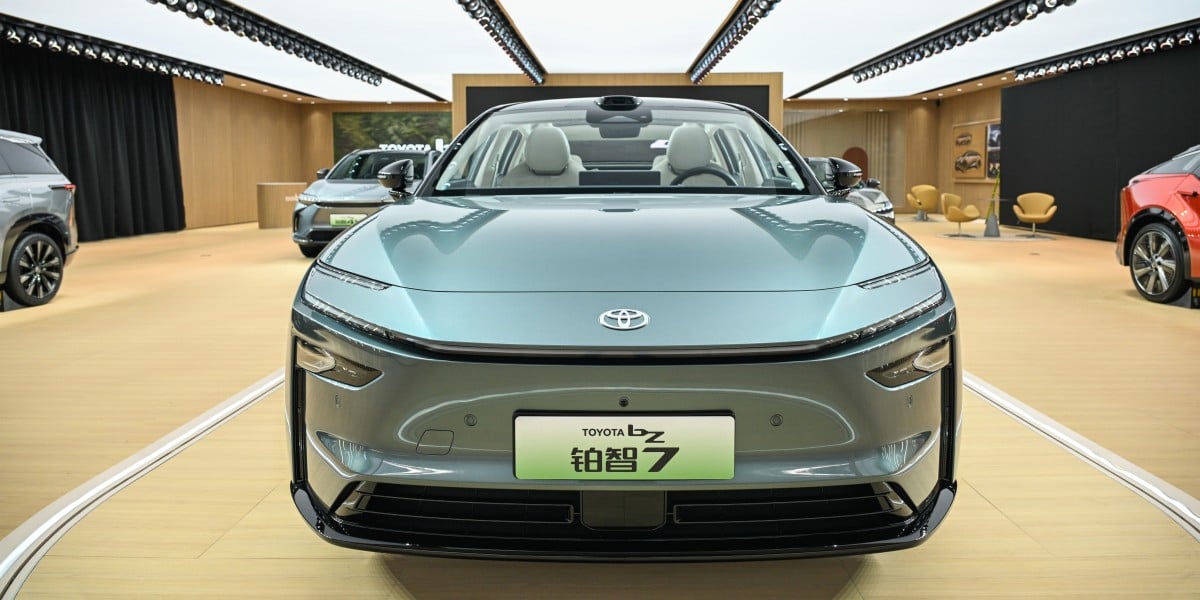Toyota Chooses Huawei's HarmonyOS for Its China-Electric Sedan, Rivaling Android

PLUS: South Korea’s SK Telecom swapping out SIM cards following an assault; India mechanizes satellite docking procedures; China makes data centers eco-friendlier; plus additional updates.
Asia In Brief Toyota last week launched a range of electric vehicles in China, one of which use Huawei’s HarmonyOS…
The Japanese car manufacturer unveiled its new lineup tailored specifically for China at the recent Shanghai Auto Show. The highlight of this event was undoubtedly the bZ7, which marks Toyota's debut into the segment of purely electric sedans intended exclusively for the Chinese market.
Toyota stated that their strategy for manufacturing vehicles in the Chinese market has evolved from merely adjusting to fit China’s needs to one that is fundamentally shaped by them. Consequently, these new models incorporate localized innovations such as HarmonyOS, an operating system developed by Huawei to reduce reliance on Android.
Huawei developed HarmonyOS for use in smartphones, tablets, smart TVs, and additional devices. A singular account allows users to benefit from a seamless and interconnected experience across all these gadgets.
Although Toyota does not hold significant sway within China's automotive sector, its choice to adopt HarmonyOS indicates that the company sees potential in Huawei as a key player moving forward.
Last week, Korea's SK Telecom acknowledged that information about their customers' SIM cards was compromised following a malware assault. The company stated that they "promptly removed the malicious software upon detecting the potential for data leakage" and additionally separated the device believed to be involved in the hack.
So far, the company has not identified any exploitation of the exposed information. However, they are clearly aware of the potential for SIM swapping attacks since they are offering free replacement of customers' SIM cards.
According to Korean news sources, more than five million clients—approximately one-fourth of all SK Telecom subscribers—have already signed up for the complimentary SIM cards. The company has issued an apology and cautioned that due to potential overwhelming demand from customers requesting new SIMs, individuals might want to schedule appointments at their local stores.
Last week, eleven Chinese governmental bodies released "Key Points for Digital Forestry and Joint Transition and Progress in 2025".
The comprehensive 22-item strategy advocates for "the eco-friendly overhaul of data centers, enhancing the sustainable functioning of base stations, encouraging environmentally conscious production and usage of electronic devices, and steering major digital tech firms towards achieving carbon neutrality."
Beijing also aims for digital technology to assist various sectors in achieving "rapid eco-friendly transition." This includes areas such as power generation, mining, metalworking, chemicals, transport and logistics, construction, city management, and contemporary agriculture.
Additionally, in China, the country’s Cyberspace Administration launched an initiative aimed at enhancing digital literacy.
Readers might recall that in January, India’s space program joined the ranks of only four others to successfully dock two orbiting satellites.
The Indian Space Research Organisation (ISRO) announced last week that they conducted the procedure again, this time with the two SPADEX satellites being brought as close as 15 meters apart before letting the autonomous systems manage the final docking process.
"The experiment entailed activating a heating component within one satellite using power supplied by another satellite. This process lasted around four minutes, with both satellites performing as anticipated," said IRSO.
Last Friday, China's manned space initiative achieved yet another milestone with the launch of a trio of astronauts destined for their Tiangong space station. On Sunday, these newly arrived astronauts took part in a handover ceremony which marks their transition into command of the station as the present occupants prepare to descend back to Earth.
Before the launch, Chinese state media announced significant advancements toward an upcoming lunar mission.
The Long March-10 rocket, manned spacecraft, the lunar lander, the moon-landing space suit, and the manned lunar rover "are all currently undergoing prototype research and development tests," as scheduled.
Chinese authorities also announced that taikonauts from Hong Kong and Macau have been chosen for upcoming missions, which serves as a significant demonstration of China’s "One country, two systems" principle.
The Singapore-based ridesharing leader and "superapp" company Grab has disclosed that they developed standardized operational procedure-driven LLM agent frameworks which have assisted them in automating certain business processes.
“Initial evaluations have shown remarkable results, with over 99.8 percent accuracy in real-world use cases,” members of the company’s engineering team wrote last week. “For example, the framework has powered solutions like the Account Takeover Investigations (ATI) bot, which achieved a 0 false rate while reducing investigation time from 23 minutes to just 3, automating 87 percent of cases.”
A fraud investigation scenario utilizing these frameworks cut down the average processing time by 45 percent, resulting in savings of more than 300 work hours each month without generating any false positives. This showcases their capability to significantly enhance complex corporate processes with exceptional precision.
0 Response to "Toyota Chooses Huawei's HarmonyOS for Its China-Electric Sedan, Rivaling Android"
Post a Comment